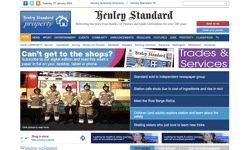
Whose quote is it anyway?
What do quote marks in headlines mean to you?
Some old school types might say a failure of the headline writer. I once worked for a paper that banned them; it was hard for me as an incoming sub who had migrated from another title where every other head seemed to have them (we must make clear this is what someone said, not what the paper thinks). They were so much easier than having to accommodate “says so and so” in a tight count. The result at the new gig was a lot of label headlines, themselves anathema to purists who insisted every head must have a verb.
Oh, how we provincial subs envied the Fleet Street tabs that brazenly ran quotes with neither inverted commas nor attribution, often thanks to a strap or subdeck that they believed did the job and excused them responsibility.
We can see that my opening question might spark a fairly lively pub / Facebook debate among the subbing community. One strand unlikely to take up much time, however, would be, “should anyone actually have said the words in quotes?” That, surely, is a given.
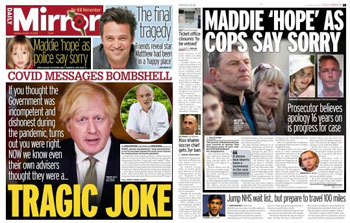
Yet last week, the Mirror did something that to this old brain was quite off the wall. It took a thought from a rather boring quote, paraphrased it into one word and then stuck that single word in quotes both in the front page puff and in the page lead headline inside. That to me would have been weird enough, but the word plucked from the relevant sentence must have been the thirtieth offered by the thesaurus. “A good sign” was turned into “hope”.
This was at best bonkers and at worst cynical. Because the story concerned Madeleine McCann.
“Maddie ‘hope’ as police say sorry” announced the puff, alongside a picture of said child. Inside, the head was repeated with “cops” instead of “police”. And what was the hope? Not, as any sane person would realise, that she was alive and might yet be found – although it’s hard to escape the suspicion that that is exactly what the Mirror wanted potential buyers to think.
Rather, that a German prosecutor (the prime suspect is in a German prison) regarded it as a good sign that Portuguese police had apologised to the McCanns for making them suspects and for failings at the start of the investigation. “It shows that, in Portugal, there is development in the McCann case.”
If that constitutes hope, perhaps the Mirror should run a correspondence course in optimism.
Much ado about not a lot
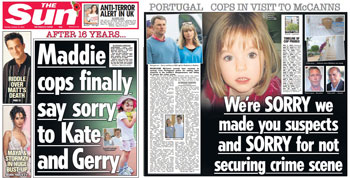
The Mirror restricted its front-page coverage of Madeleine McCann to a puff. For the Sun, it was the splash and a spread. “Police have finally apologised to Madeleine McCann’s parents – 16 years after she went missing…Officers have now flown from Lisbon to London to say sorry for how the family were treated and how the case was handled,” read the page one text.
Officers have flown? Some might take that to mean that they’re on their way or that this has just happened. But some would be mistaken. The inside story tells us that they came “earlier this year”.
The apology was the only element of the coverage that had not come out before; the rest was a runaround of what happened in Praia de Luz, the various theories and suspects, and the progress – or lack of it – of the investigation by assorted police forces. Except… even the apology had been put in the public domain before. The previous night. On Panorama. On the hated BBC, which – as we know from stories about everything from the Diana interview to Gary Lineker to semantics over whether Hamas should be called terrorists – cannot be trusted.
So, the lead and two pages of what for forty years was our best-selling newspaper could be boiled down to, “A television programme raked over the coals of a 16-year-old crime and came up with one nugget that we didn’t know about.” Great stuff.
Meanwhile, “Boris blasted”, the inside story on the chaos in Downing Street as the pandemic caught hold, as described to the Covid inquiry, was given a slim page 6 lead, running to 232 words.
“Unforgivable” – according to who?
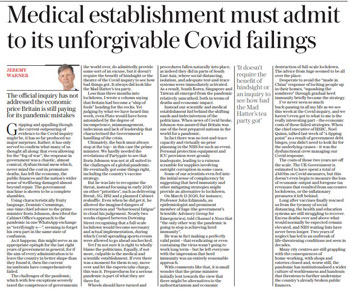
There was another example of misrepresentation in the Telegraph business section a couple of days later. The front-page puff to Jeremy Warner’s column read: “Covid costs The inquiry has ignored the economic price Britain is still paying for mistake (sic) in managing pandemic”.
Inside, the headline was “Medical establishment must admit to its unforgivable Covid failings”.
Now Warner, in common with many of his colleagues, has been consistently critical of the handling of the pandemic from the outset. He probably does think the “medical establishment” made unforgivable errors. But he didn’t write that. He said it was equally, if not more, culpable than the dysfunctional government, that it should have been better prepared and that it should have given better advice. He even suggested that scientists and doctors should have staged some sort of coup – “say move over and let the experts take charge”. But there is nothing there about whether these failings were forgivable or not.
Nor did he say the inquiry had ignored the economic costs of the pandemic. Probably because it hasn’t. This phase of the investigation is focused on ministerial decision-making, not on the consequences of those decisions. That may come later. As Warner acknowledges in the sentence: “We haven’t even got to what to me is the really interesting part – the economic costs of these failed strategies.”
This may seem like nit-picking. But it is a sub’s job to crystallise what a news report or a columnist is saying, not to project on to them the house agenda.
An affront to British values. Attribution, please…

Now, let’s take a look at Saturday’s Express splash: “‘Hate marches’ are an affront to British values”. Under the old subbing rule above, that would mean someone was talking about “hate marches” and that the paper believes they are an affront to British values. Wrong. But there are two voices at play here. The prime minister is concerned that protests planned for this weekend over the war in Gaza might disrupt Remembrance Day ceremonies. He expresses a fear that the Cenotaph and other war memorials might be desecrated and says that that would be an affront to British values. He doesn’t say anything about “hate marches”.
Suella Braverman provides that element of the headline, saying, “It is entirely unacceptable to desecrate Remembrance Day with a hate march through London. If it goes ahead there is an obvious risk of serious public disorder, violence and damage as well as giving offence to millions of decent British people.”
This headline is interesting in that the paper distances itself from the phrase “hate march” by putting it in quotes, but accepts Rishi Sunak’s words about “an affront to British values” not as an opinion, but as a solid fact that needs neither attribution nor the cover of those little rabbit ears. The Express does this a lot. Somebody should have a word in Gary Jones’s ear: just because a politician says something, doesn’t make it gospel truth.
Freedom of speech. Right to protest. Depends on who is speaking and who is protesting…

The Express has had quite the bee in its bonnet about the planned demonstrations. The day before the story mentioned above, it led with the plea, “Don’t ruin our nation’s day of remembrance”, and on Monday, the first of two spreads on the Middle East conflict was dominated by the headline, “Vandalise the Cenotaph and you’re going straight to jail” – once again on the basis of comments by Braverman.
It has not been alone in what has looked like a concerted attempt by so-called champions of free speech to suppress people’s right to demonstrate. The Telegraph’s Monday splash was, “Met chief urged to ban Armistice Day protest”, and the Mail had a spread headlined, “Will police call off Gaza demo?”
The Sun’s lead that day was, “Show some respect” (with poppies for the o’s) under a strap, “Fury over marches”. There was more of the same on Tuesday, by which time the police had been moved to ask organisers to postpone their rallies – falling short of the ban the papers were itching for.

While others focused on a cheap pill that could prevent hundreds of thousands of women getting breast cancer, both whitetops again splashed on the demonstrations, each with a spread inside.
The Mail is now so agitated by the prospect of people protesting that it has even downgraded its bombshell most-anticipated sensational political book of the year serialisation.
Let’s look in some detail at last Friday’s “Hate marches” lead in the Express. The story quotes the prime minister, the home secretary and a further four senior Conservative MPs voicing concerns about the planned marches before anyone else gets a look in. When the police are eventually consulted, they say that protest organisers have told them that they intend to gather on Saturday, not Sunday – so they should not disrupt the wreath-layings. Meanwhile, one rally organiser says they intend to avoid Whitehall and the Cenotaph, and another campaign group says, “We will not be at the Cenotaph. We understand the sensitivity of the date.”
Nevertheless, Tom Tugendhat says the Palestine Solidarity Campaign intends to march on Sunday and that there have been calls for a million join the various protests in London. If there is such a turnout, the politicians’ concerns may be justified. But is it likely?
Protest organisers all over the world have called for million-strong marches over recent decades, but they rarely, if ever, materialise. They have certainly never done so in this country. Both the anti-Iraq war march in 2003 and the anti-Brexit march in 2018 were said at the time to have numbered a million, but scientific analysis of crowd photographs subsequently put them at about 750,000 and 700,000 respectively. Both of those marches were against policies with huge domestic implications. Will more take to the streets to show support for people two thousand miles away?
Of course, you don’t have to have a million people on the march to cause trouble – there were thought to be about 250,000 at the poll tax protest that turned into rioting in 1990. Equally, large numbers do not necessarily mean public disorder: arrests at the Iraq and Brexit protests could be counted on two hands. Whether these big demonstrations turn nasty is often down to policing.
And it is up to the police to marshal and control these events, not for politicians to second-guess how crowds will behave or to predict, on the basis of little evidence, that the marchers will turn into vandals. There have been a series of demonstrations in this country since the Hamas massacre a month ago. Some people have shouted “Jihad” and chanted “From the river to the sea” and some Palestinian flags have been draped over war memorials. It has got uglier as the weeks have gone by with reports of poppy sellers being assaulted and the appearance of graffiti. But the “tensions” that newspapers have been reporting as “growing” seem to have been fertilised as much by British politicians and their media supporters as by events in the Middle East.

What politicians can do is set the parameters of what is legal and legitimate protest and what powers the police should have – and this home secretary doesn’t seem shy about doing so. She certainly made it clear that she’d be more than happy for the Met to seek her approval to ban the rallies this weekend – whether they are anti-Israel, pro-Palestinian or simply calls for peace. She has already “had words” with the Met about chanting at earlier demonstrations (having previously had words with them for failing to protect free speech). In both instances, her words were reported approvingly by the likes of the Express.
Whether she is intent on grabbing headlines, pitching for the leadership or is simply speaking from the heart, Braverman is definitely becoming more strident in her language, rather than moderating it. She has upped the ante with her Times oped today, repeating the “hate march” theme with added “pro-Palestinian mobs” and Islamist “assertions of primacy”, alongside claims that police were biased towards the left and references to the Troubles that have upset all sides in Northern Ireland and Westminster.
On Tuesday, the police again said that the marches could go ahead. But, having secured the noisy support of the rightwing press (another four pages in the Mail yesterday and the splash and a spread in both whitetops today). I would not bet against Braverman getting her way. The publicity and the threats are luring all sorts of counter-demonstrators out of the woodwork so that the chances of a peaceful rally diminish by the hour. That means the demos may have to be banned at the last minute, with all the chaos that would cause. And if they do go ahead, there is every likelihood that there will be clashes caused by the presence of the anti-marchers – and the cries of "I told you so" will be heard on the other side of the world.
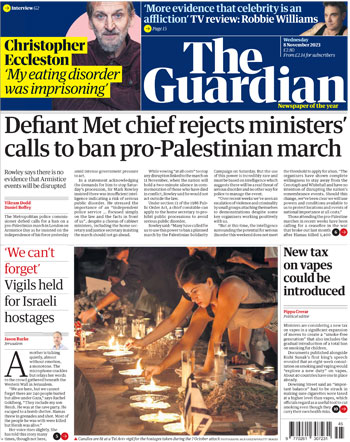
Remembrance Month

Remembrance Sunday is, of course, an important day in our national calendar, a day we pay our respects to those who died for us with parades, special services, and a couple of minutes’ silent reflection. Most of us think it fitting that the country should come together and pause at such a moment.
But that is not enough for some of our newspapers, commentators and politicians. Most titles put a poppy on their masthead for the whole of November (some have already been wearing them for a fortnight) and any TV presenter who appears without their chest suitably adorned can expect the world to come crashing down on them. This leads to such ridiculous situations as David Tennant in a stripey jumper being interviewed about Shakespeare last night with a poppy that had clearly been pinned to him just before he entered the studio. Individuals’ behaviour is increasingly being prescribed – and proscribed – by the press. Or fear of it.
The commemorations are also extending – like the lifespan of the poppy that was once for that one special day. In recent years, we have started to hold a second two-minute silence on Armistice Day itself – November 11 – so that this year we have an entire remembrance weekend. (Strangely, I have seen little disquiet in the press about the fact that the Lord Mayor’s Show, with its military marching bands, will be driving a coach and horses – literally – through the two minutes’ silence in the City of London at 11 o’clock on Saturday.)
Another sign of how what started as a focused occasion is morphing is the way it appears also to have become a time to hail those currently serving in the forces. There may be some logic in this – to acknowledge those who may now be putting their lives at risk – but it is a dangerous extension (thankfully, we haven’t yet got to the stage of clapping for our soldiers after the Last Post). For there is already conjecture that some of those making the most noise about the importance of honouring the dead are really more interested in glorifying war (I couldn’t possibly comment).
Getting the tone right in the way we show support for our forces is difficult, but important. Especially at a time when two wars, in which we are taking a close interest, are raging. So, I’m far from convinced that dressing up a princess in camouflage fatigues to play soldiers in an armoured car or pilot drones just now was a brilliant idea. And putting her, smiling in that garb, on the front page alongside stories opposing a march for peace – as four papers did this morning – strikes me as crass in the extreme.
Newspaper columnist visits Jerusalem

The obsession with the marches came as Israel intensified its bombardment of Gaza, launching attacks from land, sea and air; cutting the strip in two and encircling Gaza City. As new violence flared on Israel’s border with Lebanon. As the Pope called for urgent help for innocent Palestinians, saying, “I pray you to stop, in the name of God, cease the fire. Let’s think about the children. Their future is being killed.” As the US Secretary of State continued his visit to the region, calling for a “humanitarian pause” to let aid into Gaza, while emphasising the importance of securing the release of people being held hostage by Hamas. You get the picture: quite a lot of both military and high-level diplomatic activity. These developments provided lead stories for the Guardian and the Times. Yet hardly any were reported in the Express.
For besides Antony Blinken, there was another visitor on the scene – not a serving minister, parliamentarian or diplomat, but an individual with no official brief. He was, nevertheless, deemed worthy of a front-page appearance on the Mail and Express and coverage in nearly every paper, apart from the Guardian. Indeed, he dominated the Express’s second Gaza spread, took the best part of a page in the Mail and the top half of a page in the Telegraph. Yes, Boris Johnson was back denouncing Hamas and offering support to Israelis who were “fighting terror on behalf of freedom-loving people around the world”.
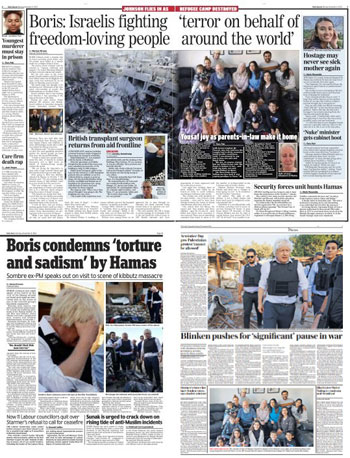
Really? What is going on here? My opinion of Boris Johnson is hardly shrouded in a mystery. But even if you remain his biggest fan (I’ll get to Nadine later), it must be apparent that this visit was nothing more than an attention-seeking distraction and that Johnson has no role to play in these tragic events. As a former prime minister, his thoughts on the conflict should be of interest. He should be able to bring calm and wisdom to a volatile situation, to recognise the nuances, the history, the issues both sides have with each other. But that would be to confuse him with Barack Obama and his measured articulation of the difficulties in bringing peace to two states that question the other’s very right to exist.
Johnson is neither statesman nor diplomat. He is a newspaper columnist and future GB News presenter (rather as Richard Madeley is) and he was using the nightmare in Gaza in the same way as he did the war in Ukraine. Things are looking tricky at home? Best scoot off to a foreign hotspot, whack on a flak jacket, shake an embattled leader’s hand and make some inflammatory jingoistic remarks. How can any serious paper believe that what he had to say was of more importance than Blinken or the Pope? Or even of more interest than Scottish first minister Humza Yousaf’s in-laws getting home safely (which, to be fair, was widely reported) or of the first-person account of the British surgeon who made the lead for the Mirror? Why do even the non-Boris-adoring press continue to play his game?
The real Johnson story
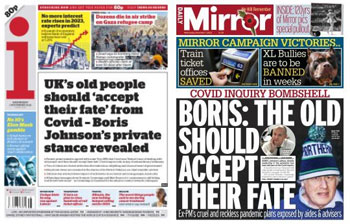
From what was Johnson trying to distract us with this display of his leadership skills? Er, an examination of his leadership skills. These were given quite the going over at the Covid inquiry this week. And it seems that those working with him in Downing Street during the pandemic were not quite as enthusiastic about him as the IDF or President Zelensky might appear to be.
Lee Cain, Dominic Cummings, Helen MacNamara all told horror stories of indecisiveness and incompetence. Some of them in what might be conservatively described as ripe language. It was a “dystopian nightmare” where rules were broken every day. Johnson had been “obsessed” with the idea that the elderly “should accept their fate”. Health secretary Matt Hancock apparently thought that he, rather than anyone trained in medicine, should decide who should live or die. Johnson had even described himself as Inspector Clouseau and the handling of the pandemic as “a humiliating disaster”. Three days of shocking testimony last week left editors spoilt for choice for headlines.
And, as we saw last time, that meant plenty of scope for papers to follow their own agendas. After Cummings’s expletive-laden testimony, the Times, Mirror and i splashed on the “accept their fate” line, while the Guardian put Downing Street’s “toxic culture” on the front (under Gaza).
This toxicity, the inquiry heard, had quite a lot to do with Mr Cummings, and the Johnson fanzines seized the opportunity to take aim at him. “Cummings fed toxic misogynist culture in No 10”, reported the Telegraph, while the Mail had “Now Cummings feels the heat”. Not one of its five front-page headings mentioned the PM wanting to leave the elderly to die. Nor, indeed, did any of the headlines on the three pages inside, which all concentrated on how nasty Dom was. Well, you can hardly make it a headline point if Johnson regarding Covid as “nature’s way of dealing with old people” is mentioned only in a throwaway sentence six pars from the end of a 1,400-word story. Meanwhile, the main headline on what was a rather elegant-looking Express front page was “Revealed: orgy of narcissm at heart of Covid failings”. Here again, it was the Johnson interpretation of the situation that was given precedence.
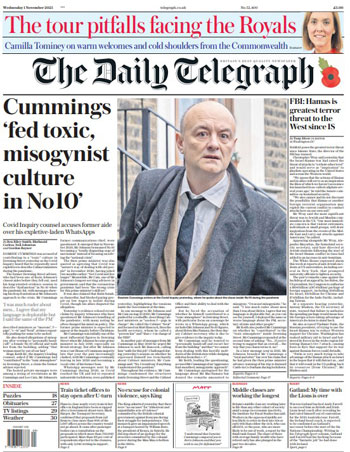
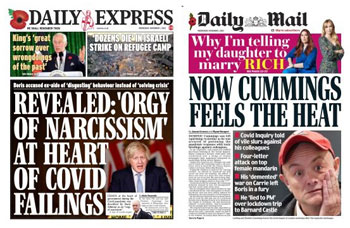
The evidence and documents presented to the inquiry over those few days showed pretty much everyone in a bad light. Cummings certainly didn’t emerge from them well. But what was new about that? People made up their minds about both him and Johnson long ago.
The key thing is that newspapers also made up their minds about the two men long ago – just as they had about lockdown and the economy – and that is colouring the reporting of the inquiry, with too many titles, including those on the left, grabbing the snippets that support and advance their own previous arguments instead of listening out for the new, the revelatory and the enlightening. The traditional press may sneer at social media echo chambers, but it is operating in the self-same closed-mind environment. It’s not healthy.
The Daily Star, at least, has a robust “a plague on all their houses” approach to all this, and it came up with a couple of zingers.
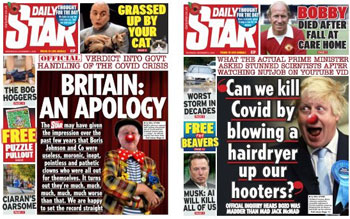
Animal rescue, Star style
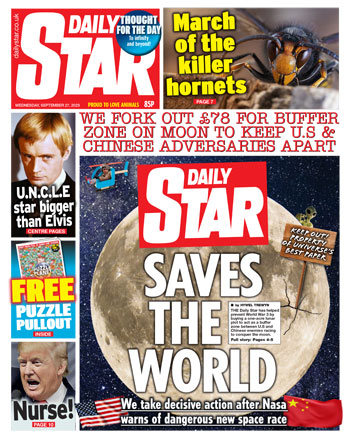
Ah, the Daily Star. Bless it. The comic cuts paper that tells it how it is. The paper willing to go out on a limb. Like the way it saved the world in September. What? You mean you missed it? “Daily Star saves the world” – and it cost only 78 quid.
NASA is worried that the Chinese are planning moonshots that might beat its own next space programme and then who knows what will happen? Well, the Star has ridden to the rescue by buying a patch of the moon to act as a buffer zone to keep the two superpowers apart, secure peace and save mankind. Quite who acted as estate agent in this deal, where the title deeds are and how the Star knew where the two space probes were planning to land so that it knew exactly which bit to buy are all obviously state secrets, since there are precious few details in the story. But rest assured, the paper has saved the world.
And for a price only a fraction of the cost of saving a Spanish donkey nearly four decades ago. Old hands will remember the saga of Blackie the donkey, which was destined for an unwelcome leading role in a festival – to be ridden around by the fattest man in the village until it collapsed. Donkey Sanctuary owner Elizabeth Svensden and local animal welfare organisations protested in the weeks before the fiesta and their campaign provided the tabloids with the biggest silly season story of 1987.
Sun reporter Huw Whittow (who went on to become editor of the Express and to claim the credit for Brexit) was sent to rescue the donkey. He paid its owner a reported £250 for the animal, had it moved to safety and the paper duly splashed on its coup. But then the Star’s Don Mackay paid off the keeper to snatch it from under its rival’s noses – crowing the next day with the headline, “Gotcha!” whose significance requires no explanation. The festival went ahead, but the donkey got off lightly and was then shipped to Plymouth to live out its days at Svensden’s sanctuary.
The sheep with three names
Compared with the price of rescuing a donkey, saving the world for £78 sounds a bargain. But how much would the Star shell out to save, say, a sheep? Not just any sheep, but “the loneliest sheep in the world”? That, I’m afraid, is as much a mystery as who sold the paper its little bit of lunar real escape.
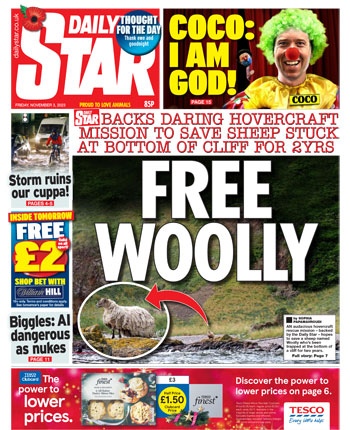
Last Friday, the paper splashed on “Free Woolly”, with a strapline “Daily Star backs daring hovercraft mission to save sheep stuck at bottom of a cliff for 2 yrs”. The one paragraph of text pretty well repeated all that, with “backed by the Star” high up. The paper’s role in the planned rescue was also emphasised inside, both in the headline and repeatedly in the text. And again in the leader on the next page: “Obviously, as a newspaper that is proud to love animals [it’s on the titlepiece], your Daily Star is fully behind the mission.” Well, obviously. But what are you actually doing? Are you paying for this enterprise or are you just egging it on?
Next day, the paper reported: “More than 50,000 people have signed up to the Daily Star’s campaign to save Woolly the sheep” alongside a ragout of a change.org petition and snippet of the explanatory text. Furthermore, the British Hovercraft Company had offered to help and a GoFundMe page had raised almost half of its £2,000 target to finance the mission.

Come Sunday, it is mission accomplished. The sheep has been picked up and the paper is celebrating “The lamb shank redemption”. There’s no mention of the Star’s part in the escapade on the front, but the “exclusive” inside story repeats that the rescuers (no hovercrafts appear to have been involved) had sprung into action “after a Daily Star campaign to save her”.
By Monday, the sheep has had a good haircut and gets a front-page puff and the best part of a page inside under the headline “Shear joy”. This tells us that “Sheep farmer Cammy Wilson led a mission to winch the animal… 820ft to safety after a campaign backed by your Daily Star.” The leader column is also in celebratory mood: “Britain’s loneliest sheep – rescued after a campaign by your Daily Star – has finally had a haircut and is set for a new life on a farm. All’s wool that ends wool!”
So that’s the story according to the Daily Star. A sheep “dubbed Woolly” (by whom?) has been at the bottom of a cliff in the Scottish Highlands for two years and is rescued, it would seem, entirely thanks to the paper’s “campaign” and its “backing” for a hovercraft mission that didn’t actually happen. How did the Star come to learn of the animal’s plight? It tells us only that it was spotted by “a kayaker”. How did it know that it had been there for two years? It doesn’t say. Did the Star launch the GoFundMe appeal? No. Did the Star launch the change.org petition? No. Was it the first to report the story? No.

For that, we must go to the Northern Times, which started the ball rolling on October 24 – ten days before the Star had a sniff of the tale. And it was a far better story than the Star has ever told. A woman called Jillian Turner was kayaking near the Firth of Cromarty in 2021 and noticed a sheep on a shingle beach at the foot of a steep rockface. She said it followed their progress and called out to her along the length of the beach before turning back “looking defeated”.
Turner assumed that the sheep would climb back up and thought no more of it. But when she repeated the kayaking trip last month, Turner was aghast to find the sheep still there, now with bedraggled fleece down to its ankles. She approached various agencies, including the SSPCA and mountain rescue services, but they were unwilling or unable to help. Now she was wondering where else she could turn to find someone to rescue the beast.
The Mail, as ever, was quick to pick up on Turner’s plea and ran a picture story in its Scottish edition on Thursday the 26th. The Telegraph and i caught up the next day – as did the Express, whose Scottish edition gave it page three (shame about the rogue “r” on the Gimme Shelter head) a full week before its sister paper. The Guardian and Times joined the throng on the Saturday.
The following Monday, someone called Edoardo L’Astorina started the change.org petition and linked his pitch to the Guardian report. A couple of days later, Michelle Chambers set up the GoFundMe page after talking to Turner and to Cromarty Firth Marine Services and the British Hovercraft Company (she raised £1,729, which she is now sending to the SSPCA). Still no word from the Star.
It finally joined the party on November 3, when the story had been just about everywhere: local newspapers, radio, TV, social media, YouTube. It would eventually go global, with papers as far afield as Canada and India picking up on it – although our Sun and Mirror, bizarrely, barely touched it.
At no stage in its coverage has the Star mentioned Turner, L’Astorina or Chambers, the people at the heart of the appeal. But it was the first to come up with a name? No. Mr L’Astorina had written on his petition page that he and his girlfriend liked to think of it as being called “Buttens”. And when the farmers rescued it, they called it “Fiona” – because a team from New Zealand that had rescued another sheep in a similar plight 20 years ago had called it Shrek (whose wife, for those without small children, was Princess Fiona). So nobody except the Star ever called her Woolly.
But, whatever her name now, never forget: it was the Star’s campaign that saved her.
But the story didn’t end there…

On the principle that no good deed should ever go unpunished, there have since been recriminations about whether it was right for anyone to lift the sheep from her world at the foot of a cliff, where she had a plentiful supply of food and water and no rivals for the bounty (she was described by her rescuers as “over-fat”), whether the right people undertook the rescue and whether she has been taken to the right place. The silly season may be long past, but we can always trust the British press to give a story like this legs. She was still there yesterday – as an internet sensation and as plans were made to auction her fleece for charity.
We can also trust a story like this to generate an abundant supply of puns. Here are a few of the best – and worst. I’ll leave you to decide which is which:
- Loneliest sheep may get ovine intervention
- Baarmy plan for sheep hovercraft rescue
- All baa myself
- We’ve got ewe under our skin
- Ewe have to feel sorry for Britain’s loneliest sheep
- When I’m calling ewe…
- Are ewe lonesome tonight?
- Life of Scotland’s loneliest sheep might no’ be a’ baahed
- Resc-ewed! (in multiple titles)
- Shear drama as resc-ewers winch Fiona the stranded sheep to safety
- Shear kindness or woolly thinking?
- Shear legends
- The lamb shank redemption
- Animal group fury at being fleeced out of Fiona rescue
- Good as ewe!
- Shorn the sheep
- Shearly beloved
- Ewe are obese
- A ewe lease of life!
- Shear joy!
- EweTube star
That’s enough sheep puns – ed
In tune with its readers’ concerns
All papers have their special interests. They don’t always coincide with what their readers are most concerned about. But sometimes they get it spot on. Last Wednesday, Metro did just that. While everyone else was focused on Gaza and Dominic Cummings, it went out on its own to splash on the U-turn on railway station ticket office closures. As commuters picked up their freebie, it was the one story they’d be guaranteed to read. No-brainer? Yes, but it’s amazing how often editors miss such an open goal. Good stuff.

What impact will Reach’s jobs cuts have on standards?
Much of this Notebook has been devoted to the print efforts of the Express, Mirror and Star – all published by Reach, the country’s biggest commercial news publisher with a stable of a dozen national daily and Sunday papers, about 130 local papers and assorted magazines and digital brands.
Yesterday, the company announced that it was planning 450 redundancies – about 10% of the workforce – with the NUJ expecting 320 of those to be journalists. This is on top of 400 job cuts announced through this year and 550 in 2020.
Inevitably, the announcement from CEO Jim Mullen came with promises to maintain journalistic standards. The new upheaval will, he maintains, help to “sustain our print products while enabling us to pursue a greater digital audience”. He continues: “What will not change is our commitment to quality journalism. The challenge now is to ensure that it continues to get seen, gets noticed, engages and makes a difference.”
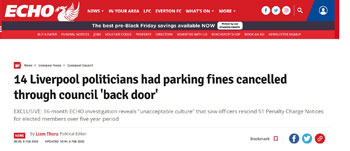
But how high are those standards? How good is the journalism? Gongs are a pretty crude way to measure excellence, but they do give a bit of an idea. Press Gazette recently published its shortlists for the British Journalism Awards to be presented next month. Of the 184 finalists, only six came from the Reach stable: three from the Mirror, one from the Liverpool Echo, plus the Express for online video and the company itself for its WhatsApp Communities.
It doesn’t look great for such a big organisation when set against 24 from the Guardian and Observer, 20 from the Times and Sunday Times and 17 from the FT. OK, they’re all “worthies” and the awards are supposed to be for serious public interest journalism. But the tabs are there too – with nine Mail and six Sun journalists shortlisted.
One interesting feature of the shortlist, in the context of the Reach restructuring, is the nomination for its WhatsApp Communities. This allows publishers to set up groups of up to 2,000 on the app and interact with readers. Talking to readers is always a good idea and the initiative has already won the innovation category at the Future of Media awards in September.
But it does feel as though the company is more concerned about how it can reach more people than about the quality of journalism it puts in front of them.
B2B journalists – asking the right questions

While looking through those British Journalism Awards nominees, one category caught my eye: Built environment journalism. Or more particularly, one candidate: Jessica Hill of Schools Week. I have not read all the various entries, so have no idea of whether she should or will win. But the date on the copy submitted is telling. On November 29 last year, she wrote: “Ministers are urgently asking for details about a ‘crumbly’ type of concrete used widely in flat-roofed school buildings, often hidden from sight but now feared to be leaving schools liable to collapse.”
November 29 last year. A full nine months before ministers gave schools just two days’ notice that many of them would not be able to start the autumn term as planned because their premises were unsafe.
This put me in mind of Peter Apps of Inside Housing, who had raised the alarm about dangerous cladding on high-rise buildings long before the Grenfell fire. He was named specialist journalist of the year in 2017, when the judges praised his “simply outstanding investigative journalism covering one of the most shocking stories of our era”. The following year, he and his magazine were again honoured in the first British Journalism Awards for specialist media and, this year, he won the Orwell Prize for his book “Show Me the Bodies: How we let Grenfell Happen”.
It is heartening to know that good journalism can and does flourish away from the bright lights of Fleet Street. If only it didn’t take tragedy and disaster to bring some of it to the surface.
Front page of the fortnight
A Reach special! It has to be that Daily Star apology.
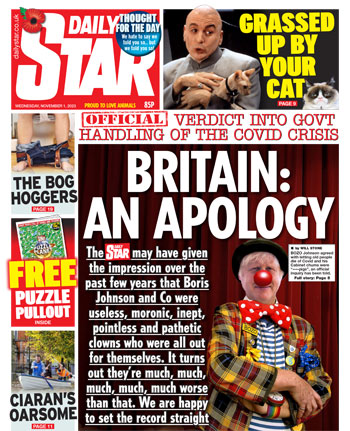
That’s all for now. See you next time.

PS. Oh, I promised Nadine and the “political book everyone’s been waiting for”. Well, she’s had her claws into Sunak and Dowden and Gove for ages, so little of the alleged plottery comes as a surprise. As to the pet rabbit nailed to the door? Was this mafia like? Or Basic Instinct like? Or Cameron with the pig like? In other words, how believable and how mad? Who’s to say?
But – and this is an almighty but – that story about the Conservative MP accused of serial rapes and of not being properly investigated was entirely believable and a matter of serious public interest.
One in seven male MPs is under suspicion and / or suspension over alleged sexual offences; one in four women is thought to have been the victim of a sex assault at some point in their lives; rape prosecution and conviction rates are through the floor. This cannot, by any stretch of the imagination, be an acceptable state of affairs. So, if the Mail’s all-guns-blazing serialisation of her book forces people to confront that situation, then all power to its – and her – elbow.

Liz Gerard’s Notebook is a fortnightly column published in the InPubWeekly newsletter. To be added to the mailing list, enter your email address here.







